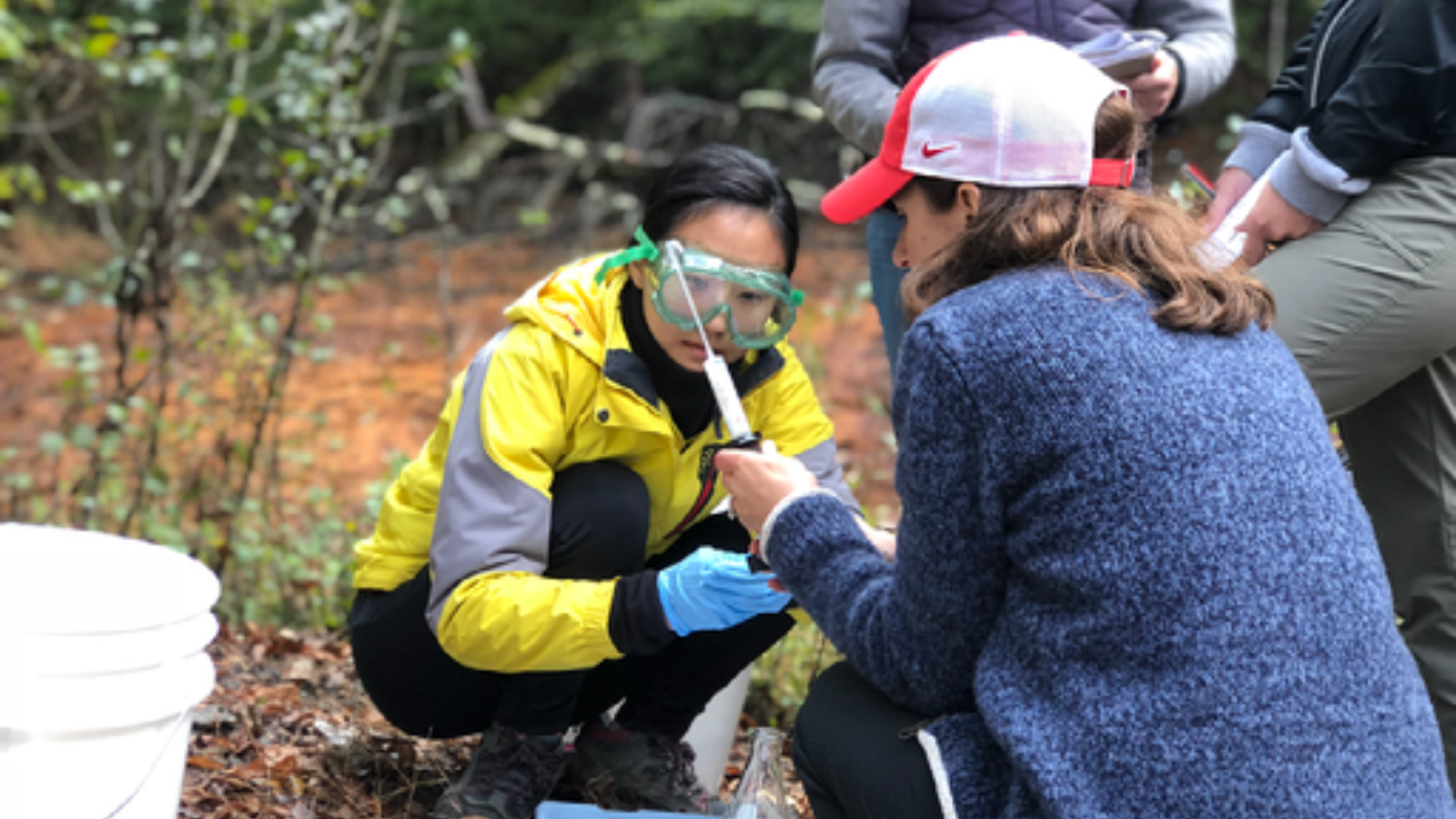BS Climate, Water, and the Environment Subprogram
BS Climate, Water, and the Environment Subprogram
The Climate, Water, and the Environment Subprogram covers a wide range of topics that address both natural processes and humankind's impact on our planet, including global climate change, polar science, water quality and availability, and the impact of urbanization on the environment. Graduates from this program will be prepared for multidisciplinary careers in climate science, earth and environmental sciences, and sustainability.
The Climate, Water, and the Environment Subprogram requires 23-26 credit hours of courses in addition to the 9-10 credit hours of core courses required for all BS students in the School of Earth Sciences. Like all Earth Science BS Subprograms, Climate, Water, and the Environment requires the completion of an approved certificate, minor, or any second major. The Climate, Water, and the Environment Subprogram has a 50% overlap with the School of Earth Sciences' Hydrogeology and Marine Science Certificates, meaning that it is possible to earn one of these certificates with as little as two additional courses.
Required coursework
Required for everyone in the Climate, Water, and the Environment Subprogram (3 units):
- EARTHSC 4450: Water, Ice, and Energy in the Earth System (3 units)
One course on Earth Materials (3-4 units):
- EARTHSC 2212: Intro to Earth Materials (4 units, lab component)
- EARTHSC 4421: Earth Materials (3 units, lab component)
- EARTHSC 4502: Stratigraphy and Sedimentology (4 units, lab component)
Two climate classes (5-6 units including at least one EARTHSC course):
- EARTHSC 5206: Advanced Oceanography (3 units)
- EARTHSC 5650: Glaciology (3 units)
- GEOG 3900: Global Climate Change: Causes and Consequences (3 units)
- GEOG 3901: Global Climate and Environmental Change (3 units)
- EARTHSC 4911: Earth’s Climate: Past and Future (3 units)
- GEOG 5900: Climatology (3 units)
- EARTHSC/ENR 5268: Soils and Climate Change (2 units)
Two water classes (6-7 units including at least one EARTHSC course):
- EARTHSC 5651: Hydrogeology (4 units, lab component)
- EARTHSC 5655: Land Surface Hydrology (3 units)
- EARTHSC 5718: Aquatic Geochemistry (3 units)
- ENR 4285: Watershed Hydrology (3 units, lab component)
- EEOB 5420: Aquatic Ecosystems – Ecology of Inland Waters (4 units)
- ENR 3280: Water Quality Management (2 units)
- ENR 4260: Soil Resource Management (3 units)
Two environment classes (6 units including at least one EARTHSC course):
- EARTHSC 5621: Introduction to Geochemistry (3 units)
- EARTHSC 5203: Geo-Environment and Human Health (3 units)
- EARTHSC 5242: Exploring the Natural History of The Bahamas (4 units)
- EARTHSC 5656: Ecohydrology in a Changing Climate (3 units)
- ENVENG 3200: Fundamentals of Environmental Engineering (3 units)
- ENVENG 2100: Environmental Engineering Analytical Methods (3 units)
- ENR 3000: Soil Science (3 units)
- EARTHSC 2000: Preparation for Thesis and Careers in Earth Sciences (1 unit)
- EARTHSC 2245: Introductory Data Analysis for Earth and Environmental Sciences (4 units)
- EARTHSC 4999.01: Undergraduate Research for Thesis in Earth Sciences (1 unit, graded)
- EARTHSC 4999.02 (H): Undergraduate Research for Thesis in Earth Sciences (0-3 units, satisfactory/unsatisfactory)
Honors program students
- Enroll in 1 unit in 4999.01H in the semester you plan to graduate.
Non-honors program students
- You need to enroll in 1 unit of 4999.01* in the semester you plan to graduate.
- You need to enroll in at least 3 unit of 4999.02H anytime during your degree, which includes the semester you plan to graduate.
Applying for research distinction
If you choose to apply for research distinction (optional), you also need to enroll in at least 3 units of 4999.02 anytime during your degree, which includes the semester you plan to graduate.
Complete at least one course focused on the Science of Sustainability (if not fulfilled in the preparation for the major) (3-4 units):
- EARTHSC 2122 (L): Climate and Life over Billions of Years on Earth (4 units)
- EARTHSC 2155: Energy and Environment (3 units)
- EARTHSC 2203: Environmental Geoscience (3 units)
- EARTHSC 2204: Exploring Water Issues (3 units)
- EARTHSC 2206 (S): Principles of Oceanography (3 units)
- EARTHSC 2210: Energy, Mineral Resources, and Society (3 units)
- EARTHSC 3411: Water Security for the 21st Century (3 units)
- EARTHSC 4425: Energy Resources and Sustainability (3 units)
- EARTHSC 4911: Earth’s Climate: Past and Future (3 units)
- EARTHSC 5663: Global Change and Sustainability (4 units)
- ENR 2100: Introduction to Environmental Science (3 units)
- ENR 5451: Water Policy and Governance (3 units)
Files
Advising information
Director of Undergraduate Studies (Earth Sciences): Professor Ann Cook, cook.1129@osu.edu
Undergraduate Academic Advisor (Earth Sciences): Dr. Karen Royce, royce.6@osu.edu, 614-292-6961
The state of Ohio does not license Geologists; however, if you plan to pursue licensure or certification in a state other than Ohio, please review state educational requirements for licensure and certification and state licensing board contact information at the Office of Distance Education and eLearning- State Authorizations for Students.

